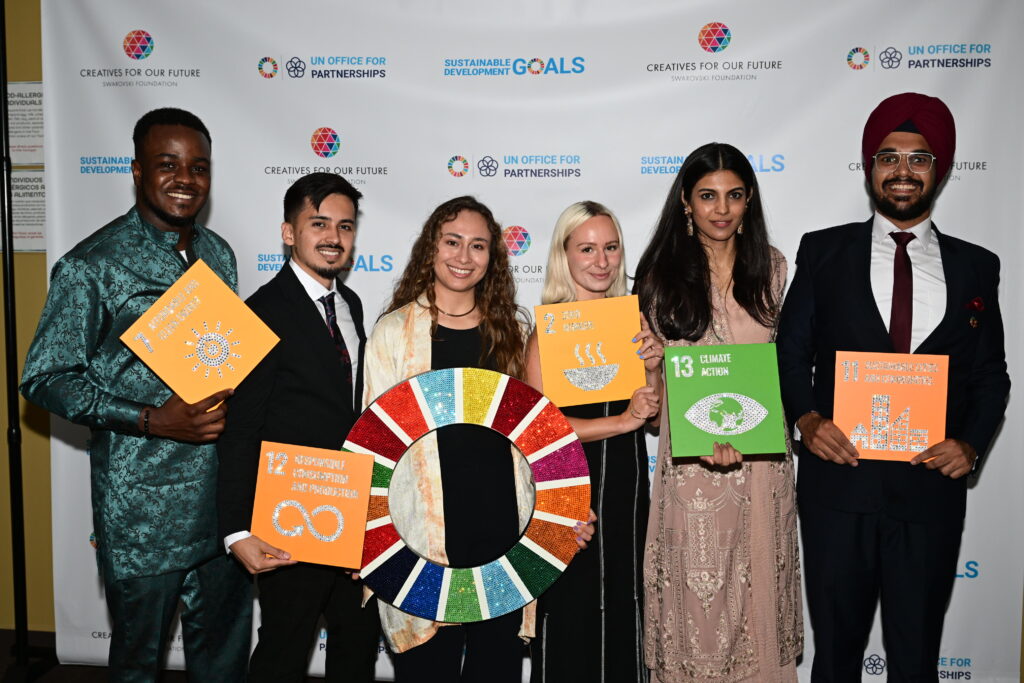The Swarovski Foundation has today unveiled the 2024 edition of the Creatives for our Future programme.
The programme, which is conducted in collaboration with the United Nations Office for Partnerships, is now accepting applications from young creatives from around the world, aged between 21 and 30 years, with innovative ideas that have the potential to accelerate sustainable development.
This year, six successful applicants will receive financial support of €20,000, along with an education programme in collaboration with top international institutions, tailored one-on-one mentorship, and industry networking opportunities to advance their innovation and career.
Entries are open from the 3rd September 2024 until 15th October 2024 (23:59 pm BST) at www.sfcreatives.org. Successful applicants will be notified and announced publicly in April 2025 at the United Nations Headquarters in New York.
From fashion, to art, to engineering, the programme has supported 21 sustainable innovation projects since its launch in 2020, enabling its beneficiaries to develop and scale their projects – either with funds to build on their research, or through mentorship and networking opportunities to unlock new directions.
“The Swarovski Foundation’s mission is to promote sustainable livelihoods through education to reduce inequality. With the Creatives for Our Future programme, we can harness this through young creative talent seeking to break innovative ground and spearhead new approaches and ideas in sustainable development”, said Jakhya Rahman Corey, Director of the Swaroski Foundation.
“Having so far received more than 1500 applications from 92 countries, and supported 21 cohort members, it showcases that creativity has the power to solve global challenges and achieve sustainability goals. The Swarovski Foundation is looking forward to welcoming this year’s applications to turn their ideas into reality through access to education, resources, and a vital support network”, she said.
Nigeria has previously raised the continent’s banner, and boasts two alumni and programme beneficiaries – Joshua Ichor and Stanley Aniogbogu. Joshua developed a hand pump monitoring system and built a clean water kiosk for rural communities in sub-Saharan Africa. His efforts have increased communal access to clean water, which is crucial in regions that lack this basic necessity. His clean water kiosk has supplied more than 50,000 litres of clean water to community members, enabling over 10,000 people in sub-Saharan Africa to access clean water every day.
Thanks to the Creatives for Our Future programme, he has now been able to expand into Kenya and Uganda and hopes to install 50 new water monitoring systems before the end of the year.
Stanley Anigbogu’s inspiration sprung from challenges faced in his early years. Stanley regularly had to study by candlelight, which resulted in eye infections from the harmful fumes. To address this problem, he developed an eco-friendly energy solution by reusing electronic waste and plastic bottles to provide clean energy and light sources for marginalised groups.
Through the Creatives for Our Future programme, Stanley has built a local AVATAR station in Nigeria, a solar-powered hub crafted from recycled shipping containers, known as the ‘AVATAR Station’. The station acts as a community hub which educates students and local residents about climate change and the benefits of renewable energy. Stanley has also now launched his own curriculum, the Eco Heroes programme. The programme not only teaches children about renewable energy, but includes mentorship from global sustainability experts and culminates in students undertaking projects that address real-world issues.
Stanley says, “Lack of access to energy is a huge problem, with candles and kerosene lamps often being the only alternatives—a challenge I’ve experienced first-hand. The Creatives for Our Future program provided me with the support and resources needed to turn my vision of reducing emissions and inspiring change into reality. The AVATAR Station, our solar-powered hub, is more than just a symbol of sustainable innovation; it’s a beacon of empowerment for marginalised communities and the next generation through our Eco Heroes Programme. By combining education with action, we are equipping young people to combat climate change effectively.”
Annemarie Hou, Executive Director of the United Nations Office for Partnerships states: “We need young talents, from fashion to engineering, to use their creativity to tackle sustainable development challenges. With mentorship, industry connections, and funding, these young people are turning obstacles into opportunities and driving real progress toward the Sustainable Development Goals. Through the Creatives for Our Future programme, we are fostering the next generation of leaders.”

